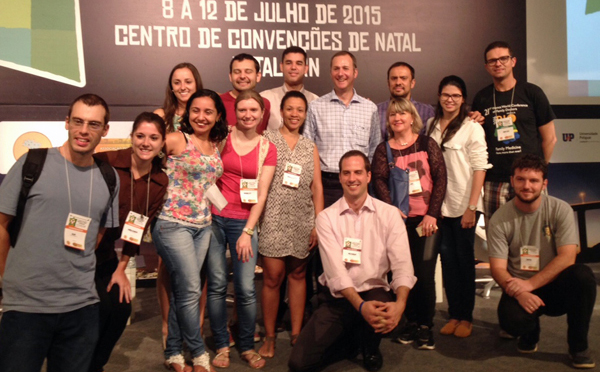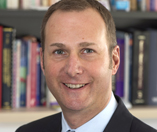From the President: WONCA and the new UN Sustainable Development Goals


Photo: WONCA President with young family doctor members of the Brazilian Society of Family and Community Medicine
español
“To promote physical and mental health and well-being, and to extend life expectancy for all, we must achieve universal health coverage and access to quality health care.”
- United Nations. Transforming our World: the 2030 Agenda for Sustainable Development
I was recently in Natal in the north-east of Brazil, meeting with members of WONCA’s member organization, the Brazilian Society of Family and Community Medicine, and speaking at the society’s 13th national congress.
As a frequent visitor to Brazil and other countries in Central and South America over the past few years, I am very impressed by the work our WONCA member organisations are doing in this part of the world, especially to ensure both quality and equity in family medicine for the people of this region of the world.
Universal coverage does not mean meeting the needs of 60% or 80% or 90% of the population – it means meeting the challenge of ensuring that health care is available to everybody. Brazil is one of the countries leading the world in strengthening family medicine to ensure that health care is available to all people. Brazil has become an important global leader in addressing universal health coverage through the famous model of family health teams of doctors, nurses and community health workers, each providing comprehensive clinic-based and home-based care as a team to a defined population.
There are now nearly 40,000 Family Health Teams in operation across the entirety of Brazil. It is a very impressive model as I hope many of our colleagues from around the world will be able to see this for themselves when they attend our next WONCA world conference in November next year in Rio de Janeiro.
I believe there is hope for global health as countries around the world, like Brazil, wake up to the importance of strengthening primary care and the role of the family doctor. You and I know that family medicine has the power to play a transformative role in the shaping of societies.
2015 is a landmark year in global health as we come to the end of the Millennium Development Goals. In September 2015, the United Nations will be asked to adopt the 17 new Sustainable Development Goals. There is only one health specific goal, number 3: “Ensure healthy lives and promote well-being for all at all ages.” But each of the 17 goals has an impact on global health and the health of individuals and communities.


Banner: United Nations call for Sustainable Development
The document going to the United Nations for approval in September is called Transforming our World: the 2030 Agenda for Sustainable Development. The preamble of the document reads:
“This Agenda is a plan of action for people, planet and prosperity. It also seeks to strengthen universal peace in larger freedom. We recognise that eradicating poverty in all its forms and dimensions, including extreme poverty, is the greatest global challenge and an indispensable requirement for sustainable development.
“All countries and all stakeholders, acting in collaborative partnership, will implement this plan. We are resolved to free the human race from the tyranny of poverty and want, and to heal and secure our planet. We are determined to take the bold and transformative steps which are urgently needed to shift the world onto a sustainable and resilient path. As we embark on this collective journey, we pledge that no one will be left behind.
“The 17 Sustainable Development Goals and 169 targets demonstrate the scale and ambition of this new universal Agenda. They seek to build on the Millennium Development Goals and complete what these did not achieve. They seek to realize the human rights of all and to achieve gender equality and the empowerment of all women and girls. They are integrated and indivisible and balance the three dimensions of sustainable development: the economic, social and environmental.”
The United Nations document focuses on people, the planet, prosperity, peace and partnerships. It states that, “We envisage a world free of poverty, hunger, disease and want, where all life can thrive. We envisage a world free of fear and violence. A world with universal literacy. A world with equitable and universal access to quality education at all levels, to health care and social protection, where physical, mental and social well-being are assured. A world where we reaffirm our commitments regarding the human right to safe drinking water and sanitation and where there is improved hygiene; and where food is sufficient, safe, affordable and nutritious. A world where human habitats are safe, resilient and sustainable and where there is universal access to affordable, reliable and sustainable energy.”
I want to share with you the elements of this new United Nations strategy that focus on health. The document recognises that “Global health threats, more frequent and intense natural disasters, spiralling conflict, violent extremism, terrorism and related humanitarian crises and forced displacement of people threaten to reverse much of the development progress made in recent decades.”
It recognizes that with the Millennium Development Goals “progress has been uneven, particularly in Africa, least developed countries, landlocked developing countries, and small island developing States, and some of the MDGs remain off-track, in particular those related to maternal, newborn and child health and to reproductive health.”
Specifically on health, the document states that, “To promote physical and mental health and well-being, and to extend life expectancy for all, we must achieve universal health coverage and access to quality health care. No one must be left behind. We commit to accelerating the progress made to date in reducing newborn, child and maternal mortality by ending all such preventable deaths before 2030. We are committed to ensuring universal access to sexual and reproductive health-care services, including for family planning, information and education. We will equally accelerate the pace of progress made in fighting malaria, HIV/AIDS, tuberculosis, hepatitis, Ebola and other communicable diseases and epidemics, including by addressing growing anti-microbial resistance and the problem of unattended diseases affecting developing countries. We are committed to the prevention and treatment of non-communicable diseases, including behavioural, developmental and neurological disorders, which constitute a major challenge for sustainable development.” These commitments will only be met through strong systems of primary care in each nation.
The document also well recognizes the importance of the environment on human health and well-being, including the need to “reduce the negative impacts of urban activities and of chemicals which are hazardous for human health and the environment, including through the environmentally sound management and safe use of chemicals, the reduction and recycling of waste and more efficient use of water and energy.”
And that we can’t have prosperity without “having a healthy and well-educated workforce with the knowledge and skills needed for productive and fulfilling work and full participation in society.”
The document even recognizes sport as “an important enabler of sustainable development. We recognize the growing contribution of sport to the realization of development and peace in its promotion of tolerance and respect and the contributions it makes to the empowerment of women and of young people, individuals and communities as well as to health, education and social inclusion objectives.”
These are bold ambitions, and as global citizens, family doctors must play our part in the implementation of the Sustainable Development Goals. People-centred care is a core component of universal health coverage, and there will be an increasing role for family medicine over the coming years in each country to ensure this happens. This global movement will provide welcome opportunities to strengthen the role of family medicine and primary care in all nations, and the important work we do as family doctors supporting the health and well-being of our individual patients, their families and our communities.
Michael Kidd
WONCA President